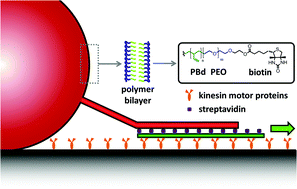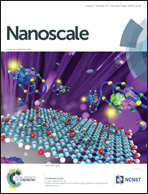Dynamic assembly of polymer nanotube networks via kinesin powered microtubule filaments†
Abstract
We describe for the first time how biological nanomotors may be used to actively self-assemble mesoscale networks composed of diblock copolymer nanotubes. The collective force generated by multiple kinesin nanomotors acting on a microtubule filament is large enough to overcome the energy barrier required to extract nanotubes from polymer vesicles comprised of poly(ethylene oxide-b-butadiene) in spite of the higher force requirements relative to extracting nanotubes from lipid vesicles. Nevertheless, large-scale polymer networks were dynamically assembled by the motors. These networks displayed enhanced robustness, persisting more than 24 h post-assembly (compared to 4–5 h for corresponding lipid networks). The transport of materials in and on the polymer membranes differs substantially from the transport on analogous lipid networks. Specifically, our data suggest that polymer mobility in nanotubular structures is considerably different from planar or 3D structures, and is stunted by 1D confinement of the polymer subunits. Moreover, quantum dots adsorbed onto polymer nanotubes are completely immobile, which is related to this 1D confinement effect and is in stark contrast to the highly fluid transport observed on lipid tubules.


 Please wait while we load your content...
Please wait while we load your content...